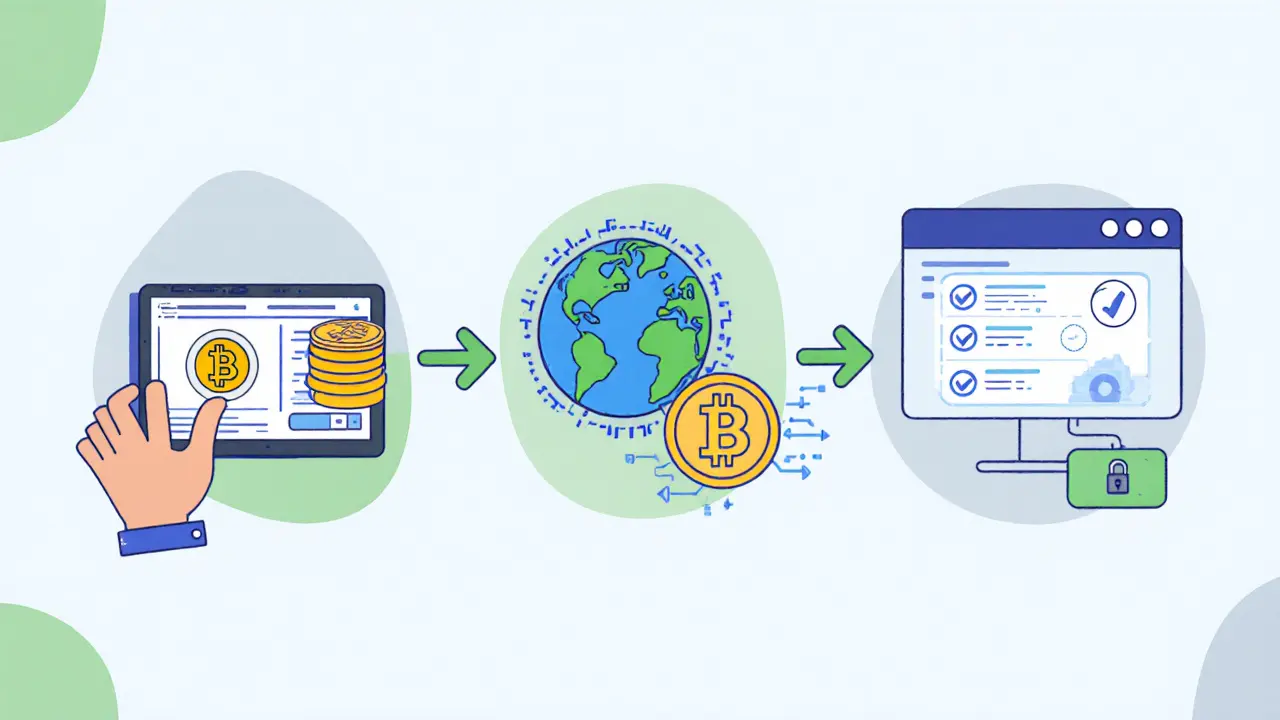In September 2024 Russia unveiled a pilot regime that finally lets companies settle international invoices with Bitcoin the first cryptocurrency authorised for cross‑border use under the new rules. The change flips a years‑long ban into a tightly‑controlled gateway for businesses trying to dodge Western sanctions. Below you’ll find everything you need to know - from who can participate to how a typical settlement looks on paper.
What the pilot law actually changes
The cornerstone is Federal Law No 221‑FZ a three‑year experimental framework that permits legal entities to use crypto for cross‑border payments. Prior to this, any crypto transaction beyond Russia’s borders was illegal. The law creates a whitelist of "pilot participants" - usually large exporters, energy firms, and banks - that must route every crypto transfer through Bank of Russia the central bank that supervises the pilot and issues compliance guidelines‑approved digital‑asset platforms.
Domestic crypto use remains prohibited. The pilot only covers the five assets explicitly listed by the central bank: Bitcoin, Ethereum, Tether (USDT), the upcoming Digital Ruble and a handful of other approved tokens.
Who is allowed to participate
The regime is deliberately narrow. Only "highly qualified" investors - defined as individuals or entities with either >100 million RUB in securities/deposits or >50 million RUB annual income - can purchase crypto‑linked products. For companies, the threshold is even higher: annual turnover of at least 5 billion RUB and a written agreement with a certified platform operator.
In practice, the first wave includes major energy exporters, large‑scale manufacturers, and a handful of state‑controlled banks. The Ministry of Finance is already drafting a relaxation of the qualification criteria, but any change will still require a formal amendment to the pilot law.
How a cross‑border settlement works
- Both parties sign a contract that references the pilot’s compliance clause.
- The Russian exporter opens a wallet on a certified digital‑asset platform a service approved by the Bank of Russia to handle pilot transactions.
- The exporter converts rubles to the chosen crypto (e.g., Bitcoin) at a platform‑approved rate.
- The crypto is transferred to the foreign partner’s wallet, which must be on a platform also on the approved list.
- Both wallets submit transaction hashes to the Bank of Russia’s monitoring portal. The central bank logs the flow, checks AML/KYC data, and issues a settlement confirmation.
- Upon confirmation, the foreign partner can convert the crypto back into local currency or retain it as a stable‑coin reserve.
Every step generates a mandatory audit trail, and any deviation triggers a potential criminal liability - a deterrent that keeps the pilot tightly wound.

Compliance checklist for businesses
- Verify pilot eligibility: Confirm you’re listed on the official participant register published by the Bank of Russia.
- Appoint a compliance officer: Must be trained on the AML methodology released in March 2025.
- Implement KYC/AML software: Must capture source‑of‑funds documentation for every crypto conversion.
- Use only certified platforms: Check the platform’s license number on the central bank’s website.
- Record transaction hashes: Store them for at least five years for tax authority inspection.
- Report suspicious activity: Any peer‑to‑peer transfer outside the pilot must be flagged within 24 hours.
Missing any of these items can lead to fines up to 10 million RUB or, for repeated offences, criminal prosecution.
Impact on Russian trade and investors
Official numbers show the pilot’s early success: by mid‑2025, cross‑border crypto trade hit 1 trillion RUB, with energy companies accounting for roughly 60 %. The A7 Group, partially owned by a sanctioned bank, reported that switching to Tether cut settlement time from 7‑10 days (SWIFT) to under 2 hours, saving an estimated $200 million in fees.
For investors, the pilot opened a narrow window to buy Bitcoin futures. In May 2025, qualified investors snapped up $16 million worth of contracts in the first month alone. The Central Bank plans to extend derivative access to investment funds by 2026, but the “highly qualified” gate will stay.
Meanwhile, the general population still relies on offshore exchanges. Estimates suggest Russians hold over $25 billion in digital assets, most of it outside the formal system.
Future outlook and potential risks
The pilot runs until 2027. If outcomes are positive - i.e., stable settlements, no major AML breaches - the Ministry of Finance may draft a permanent law that expands eligibility and possibly relaxes domestic restrictions. However, the Bank of Russia has repeatedly warned that any attempt to normalise crypto inside Russia could trigger new sanctions, so domestic use will likely stay off‑limits.
Geopolitical pressure remains the biggest wildcard. A renewed wave of Western sanctions could force Moscow to deepen crypto reliance, while a diplomatic thaw could see the pilot wound down in favour of traditional banking.

Comparison: Domestic vs Cross‑border crypto use under the pilot
| Aspect | Domestic crypto (still banned) | Cross‑border pilot (allowed) |
|---|---|---|
| Legal status | Illegal for any transaction | Permitted for approved legal entities only |
| Allowed assets | None | Bitcoin, Ethereum, Tether, Digital Ruble, selected stablecoins |
| Regulatory oversight | Criminal liability, no supervision | Bank of Russia supervision, mandatory reporting |
| Investor qualification | Not applicable (public prohibited) | Only "highly qualified" investors or large firms |
| Tax treatment | Undeclared, risk of evasion charges | Declared, taxed as foreign‑exchange income |
Quick takeaways
- The pilot legalises Russia crypto regulations for cross‑border Bitcoin and a few other tokens.
- Only firms and investors meeting strict financial thresholds may join.
- All transfers must go through Bank‑approved platforms and are logged in real time.
- Early data shows a trillion‑ruble boost in international trade, especially in energy.
- Domestic crypto remains illegal; the pilot is a controlled experiment lasting until 2027.
Frequently Asked Questions
Can any Russian company start using Bitcoin for imports?
No. Only companies listed in the official pilot register and that have a partnership with a certified digital‑asset platform may settle cross‑border invoices with Bitcoin or the other approved tokens.
What happens if a transaction is made outside the pilot?
The Bank of Russia treats it as a criminal violation. Penalties range from heavy fines to possible imprisonment, depending on the transaction size and repeat offenses.
Are Russian individuals allowed to buy Bitcoin directly?
Only if they qualify as "highly qualified" investors - that means at least 100 million RUB in securities or a 50 million RUB annual income. Otherwise, personal purchases must be done on foreign exchanges, which remain unregulated by Russian law.
When will the Digital Ruble be usable for international trade?
The Digital Ruble pilot started in 2023 and is slated for large‑enterprise rollout on 1 September 2026. Full merchant adoption is expected by 2028, but its cross‑border use will still be confined to the pilot framework.
Will the pilot likely become permanent law?
The government has said the three‑year experiment will inform a permanent regime. If compliance is smooth and sanctions pressure persists, a broader law could emerge after 2027, possibly easing investor thresholds but keeping domestic crypto banned.




Comments (12)